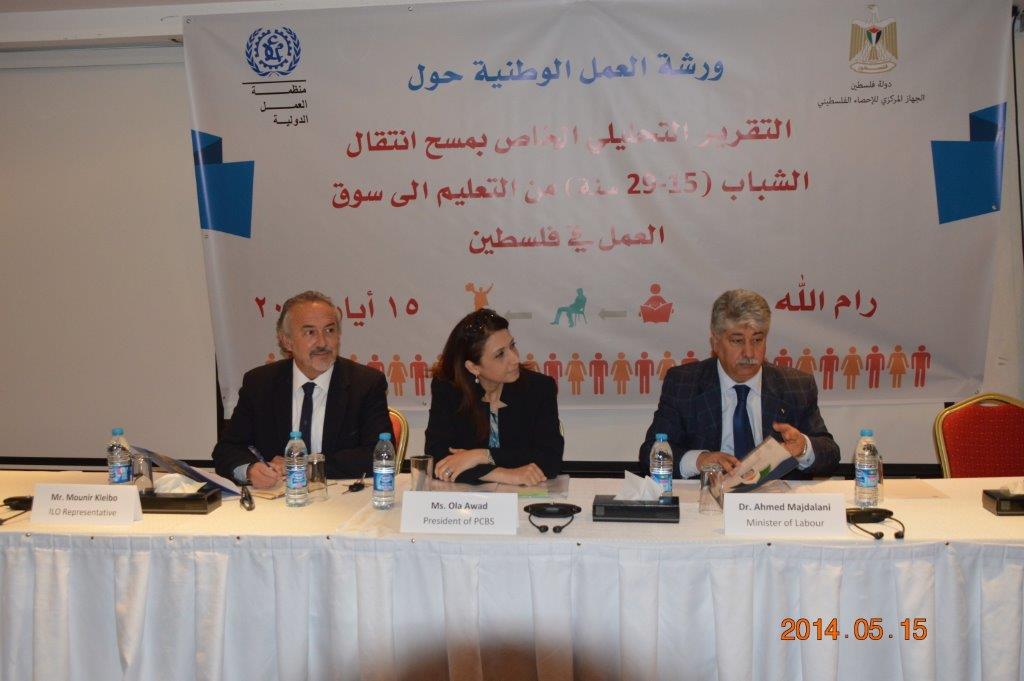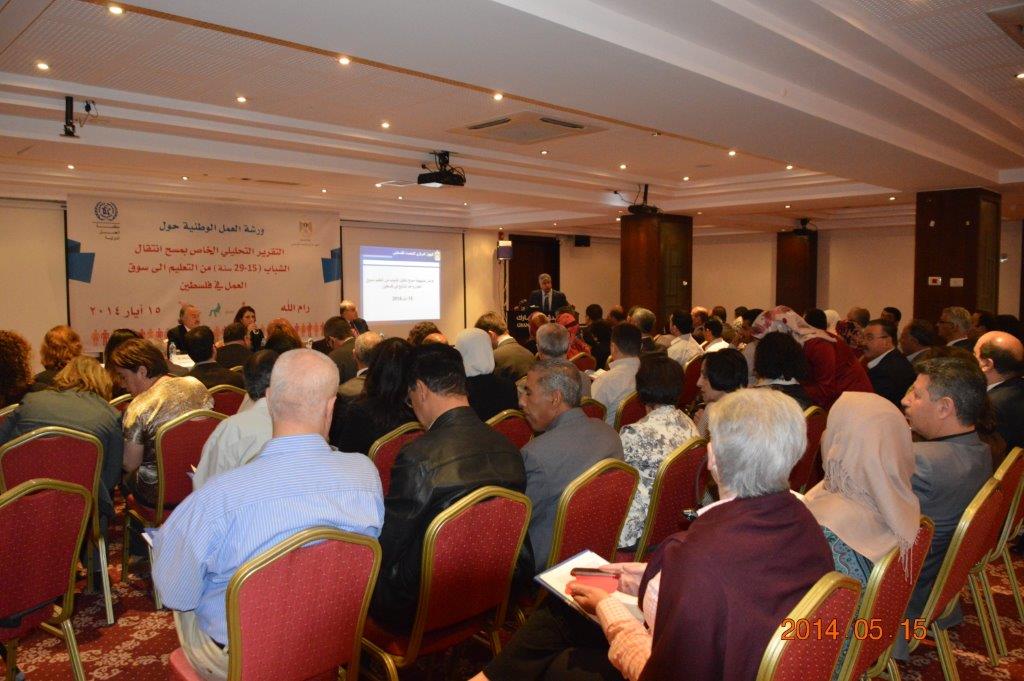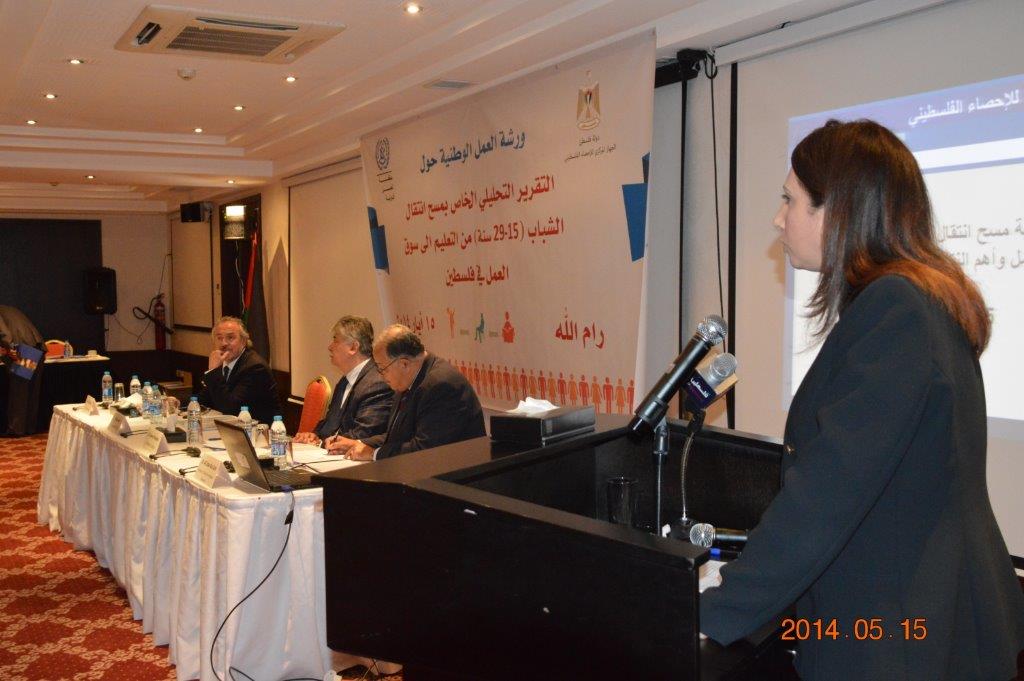|
Palestinians struggle with school to work transition PCBS in Collaboration with the ILO announced the results of the Youth Transition from school to Work Survey, 2013
Under the Auspices of the Prime Minister Prof. Rami Hamdallah; the Palestinian Central Bureau of Statistics (PCBS) in collaboration and partnership with the International Labour Organization (ILO) organized a national workshop on Thursday, 05/15/2014 at the Grand Park Hotel in Ramallah to announce the results of the young people's transition from School to Work survey, 2013. Many representatives of the ministries and public and private institutions and international research centers and those interested in the media and journalists attended the workshop.
|
|
|
It also found that those with better education struggle to find work that suits their skills and education and the rate of labour force participation is extremely low, particularly among women. The findings of the study, which aims to highlight some of the challenges associated with youth labour market transition in the Occupied Palestinian Territory, are based on the ILO’s “school-to-work transition survey’’, a household survey of young people aged between 15 to 29 that was implemented by the Palestinian Central Bureau of Statistics in 2013. It was unveiled by the ILO during a meeting in the West Bank city of Ramallah between government officials, unions, employer representatives, NGOs, youth organizations, and UN agencies. The highest unemployment rate was among new youth graduates (15- 29) years who hold associated diploma certificate and above 75.4 percent, (67.1 percent for males and 83.5 percent for females). The highest unemployment rate was for youth (15-29) years specialized in life sciences 70.4 percent, then those who are specialized in Humanities 64.7 percent. For males the highest unemployment rate was for the youth specialized in Mathematics and Statistics 47.3 percent, then those who are specialized in Personal Services 45.8 percent. For females the highest unemployment rate was for youth specialized in Journalism and Information 88.9 percent, then those who are specialized in life science 82.3 percent. The survey found that youth labour force participation rate is very low at 38.5 per cent and reflects a wide gender gap, with 61.8 percent among young men compared to 15.6 percent among young women. More than 8 in 10 young women are inactive compared to less than 4 in 10 young men. ‘’An area of concern is the high share of young women who are inactive and not in school. Nearly one-third of young women fall into this category, a share that is ten times greater than among male youth,’’ said Sara Elder, an ILO economist and Senior Research Specialist on the Work4Youth Programme. ‘’The sizable share of young females who are neither in the labour force nor in education or training has an impact on the productive potential of the country.’’ About 22.6 percent only of young Palestinians have completed their labour market transition to stable or satisfactory employment, the majority of which are men. Nearly half have not started the transition, and 31.8 per cent remain “in transition”. The survey found that transition periods for many youth are long, averaging 2.5 years before finding a stable job. The results of the survey imply that the skill level required by the labour market are not very high and better educated young people face long queues for the few available professional jobs. “Yet it is important to remember that while the young university graduates face a more difficult time to find work, there are still clear signs to verify the gains of education in terms of access to higher wages and better quality employment” said Elder. Poor quality of employment, from long working hours, unsatisfactory work to qualification mismatch, is a major concern that impacts the capacity of the youth to make the most of their economic potential. As many as 68.6 percent of those survey are working without a written contract, and another 13.1 per cent have a contract of limited duration. Only one-third or fewer of young workers have access to key benefits. The survey was implemented by Palestinian Central Bureau of Statistics (PCBS) and is part of the ILO’s Work4Youth Project, which is a partnership between the ILO and The MasterCard Foundation. Palestine has been one of the 28 countries around the world to take part in this survey.
|
|
Close
Close
 عربي
عربي


